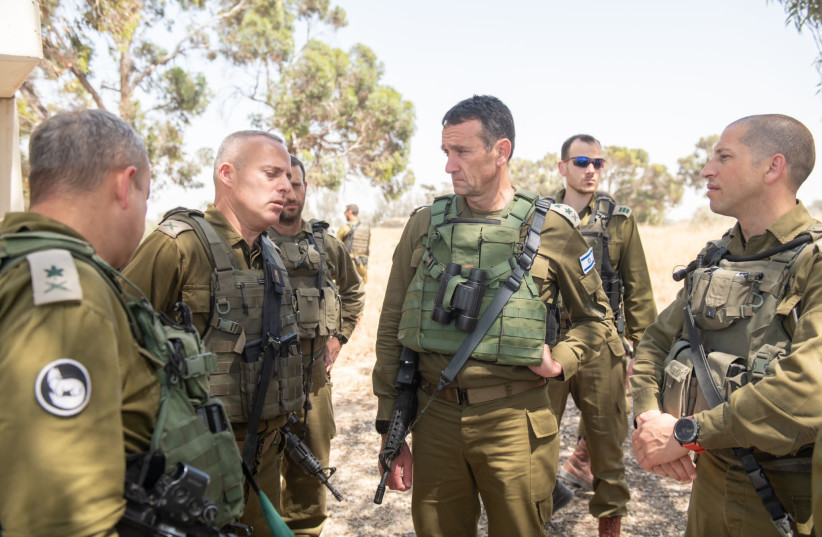Ceasefire talks ongoing as 350 Gaza rockets shot at Israel
Egypt continued mediating a ceasefire between Israel and Palestinian Islamic Jihad to end Operation Shield and Arrow on Wednesday, even as the latter continued a barrage of rockets towards Israeli cities in the south and Tel Aviv area.
“The campaign still isn’t over,” Prime Minister Benjamin Netanyahu said in a statement to the media. “We say to the terrorists and those who sent them: We see you everywhere; you can’t hide.”
However, a senior diplomatic source said that Israel is “ready for a ceasefire; we did what we needed to do” in Gaza.
“A ceasefire will be judged only by actions and not by words,” another senior diplomatic source said.
Following over 100 IDF strikes and over 300 rocket attacks mostly from Palestinian Islamic Jihad of Gaza earlier Wednesday, Egypt reached out to Israel to say PIJ wants a ceasefire, The Jerusalem Post confirmed from multiple sources.
 IDF Chief of Staff Herzi Halevi is seen during a situational assessment as part of Operation Shield and Arrow along the Gaza border on May 10, 2023 (credit: IDF SPOKESPERSON’S UNIT)
IDF Chief of Staff Herzi Halevi is seen during a situational assessment as part of Operation Shield and Arrow along the Gaza border on May 10, 2023 (credit: IDF SPOKESPERSON’S UNIT)Further, top IDF officials have recommended accepting a ceasefire in light of major perceived accomplishments of the current operation – though publicly the IDF said it does not comment on such issues.
However, as late as 8:00 p.m., Islamic Jihad and the IDF had each unleashed another significant round of attacks against one another.
Foreign Minister Eli Cohen confirmed to KAN News that a ceasefire proposal was sent by Egypt and is under consideration by the defense establishment.
The senior diplomatic source said that Egypt is the central player in ceasefire talks, despite reports in Arab media that Qatar and the UN were involved.
Rocket barrage launched at southern, central Israel
According to unconfirmed Palestinians reports, 21 Palestinians have been killed, with no indications yet from Israel about their identities as combatants or civilians.
Netanyahu said that no Israelis died during Operation Shield and Arrow, though there have been reports of a number of injuries.
Earlier, around 12:30 p.m., the IDF initiated a widespread preemptive strike on a variety of Islamic Jihad rocket positions, including some concealed from the public eye, after seeing intelligence signs that the terror group was getting ready for a broad round of rocket attacks on Israel.
At 11:45 a.m., the IDF carried out its first attack of Wednesday on an Islamic Jihad crew that was getting ready to fire rockets near the southern Gaza city of Khan Yunis.
This incident came after a similar incident on Tuesday early evening.
After these incidents and along with other intelligence signs, IDF chief spokesman Brig. Gen. Daniel Hagri said that the IDF decided instead of only selectively attacking rocket crews on their way to their rocket firing positions, to preemptively attack a variety of concealed rocket positions that intelligence had previously found.
At that point, Hagari said that the IDF’s rationale was that it was better to put the Jihad organization back on its heels again, rather than trying to track dozens of rocket crews once they are already out near their positions.
Around 1:00 p.m. on Wednesday, the IDF’s analysis of why Islamic Jihad delayed striking back related to shock that the group was going through from a surprise attack overnight between Monday and Tuesday eliminating three of its top leaders and 10 key military positions, followed by the IDF successfully thwarting its initial attempts to strike back, said Hagari.
For example, the IDF’s attack on an anti-tank missile crew on Tuesday evening thwarted an initial move to use one of its more advanced weapons against Israel, as opposed to many of its rockets, which are less precise.
Hagari rejected any conception that Islamic Jihad was successfully using psychological warfare against Israel by rolling out its counter strike slowly.
Rather, the IDF’s view would be that it has been consistent about keeping Islamic Jihad on its heels, but without getting drawn into a longer fight or a larger fight with Hamas.
IDF chief-of-staff Lt. Gen. Herzi Halevi visited the South early Wednesday afternoon to personally ensure that Israel’s missile defense and other defense elements remain on the highest levels of alert.
If Hamas had joined in in a serious way, the conflict could have been extended longer than the multiple rounds Israel has had with Islamic Jihad which have all ended in less than 72 hours.
But Hamas mostly stayed out of the fight, despite some of its public statements that it would join in.
The IDF said on Wednesday that the David Sling missile defense system had also been used to shoot down a mid-range rocket fired at Tel Aviv.
David’s Sling
In 2018, David’s Sling was used against two missiles being fired from Syria, but it has not been used operationally since then.
Moreover, the IDF wanted to emphasize that this was the first time David’s Sling was used in defense of Tel Aviv.
It was only used on Wednesday as an opportunity to test its status in a situation where there were fallback alternatives.
Along with the Iron Dome against short-range rockets and the Arrow defense system against long range missiles, David’s Sling is the middle element of Israel’s missile defense.





Comments are closed.